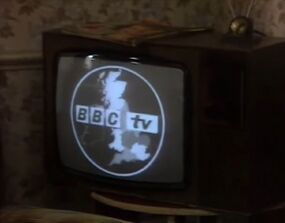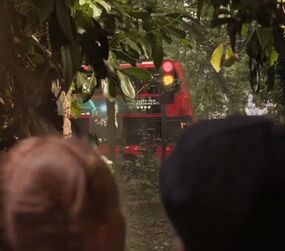User:Epsilon/Sandbox Four: Difference between revisions
No edit summary |
No edit summary |
||
| Line 11: | Line 11: | ||
'''''Doctor Who''''' was a [[BBC]] [[science fiction]]/[[drama]] [[TV series (Remembrance of the Daleks)|series]] that premiered in late [[1963]]. | '''''Doctor Who''''' was a [[BBC]] [[science fiction]]/[[drama]] [[TV series (Remembrance of the Daleks)|series]] that premiered in late [[1963]]. | ||
The series oriented around the adventures of the eponymous time traveller, "[[The Doctor in popular culture and mythology|the Doctor]]", also was also referred to as "Doctor Who". | The series oriented around the adventures of the eponymous time traveller, "[[The Doctor in popular culture and mythology|the Doctor]]", also was also referred to as "Doctor Who". | ||
== History == | == History == | ||
| Line 56: | Line 56: | ||
=== The Doctor === | === The Doctor === | ||
While appearing to simply be a fictional character to the general populace of Britain, ([[PROSE]]: ''[[Afterword (short story)|Afterword]]'', ''[[Fanboys (short story)|Fanboys]]'', ''[[Hospitality (short story)|Hospitality]]'', ''[[The Terror of the Umpty Ums (short story)|The Terror of the Umpty Ums]]'') there were individuals who knew that the Doctor was real, ([[PROSE]]: ''[[Bafflement and Devotion (short story)|Bafflement and Devotion]]'', [[WC]]: ''[[The Zygon Isolation (webcast)|The Zygon Isolation]]'', et al) although this feat wasn't exactly ''difficult''. ([[COMIC]]: ''[[Action in Exile (comic story)|Action in Exile]]'', [[TV]]: ''[[Rose (TV story)|Rose]]'', ''[[Love & Monsters (TV story)|Love & Monsters]]'', et al) | While appearing to simply be a fictional character to the general populace of Britain, ([[PROSE]]: ''[[Afterword (short story)|Afterword]]'', ''[[Fanboys (short story)|Fanboys]]'', ''[[Hospitality (short story)|Hospitality]]'', ''[[The Terror of the Umpty Ums (short story)|The Terror of the Umpty Ums]]'') there were individuals who knew that the Doctor was real, ([[PROSE]]: ''[[Bafflement and Devotion (short story)|Bafflement and Devotion]]'', [[WC]]: ''[[The Zygon Isolation (webcast)|The Zygon Isolation]]'', et al) although this feat wasn't exactly ''difficult''. ([[COMIC]]: ''[[Action in Exile (comic story)|Action in Exile]]'', [[TV]]: ''[[Rose (TV story)|Rose]]'', ''[[Love & Monsters (TV story)|Love & Monsters]]'', et al) | ||
The Doctor was also referred to as "Doctor Who", ([[PROSE]]: ''[[Hospitality (short story)|Hospitality]]'') and had at least seven known incarnations. ([[PROSE]]: ''[[Fanboys (short story)|Fanboys]]'', ''[[Hospitality (short story)|Hospitality]]'', [[WC]]: ''[[The Zygon Isolation (webcast)|The Zygon Isolation]]'') | |||
=== Clara === | |||
The only named companion was Clara, a young, brunette woman. She appeared in the ninth series of the show, ([[WC]]: ''[[The Zygon Isolation (webcast)|The Zygon Isolation]]'') and bore a remarkable similarity to [[Clara Oswald]]. ([[TV]]: ''[[The Bells of Saint John (TV story)|The Bells of Saint John]]'', et al) | |||
== Alternate accounts == | == Alternate accounts == | ||
Revision as of 18:29, 8 November 2020
- You may wish to consult
Doctor Who (disambiguation)for other, similarly-named pages.
Doctor Who was a BBC science fiction/drama series that premiered in late 1963.
The series oriented around the adventures of the eponymous time traveller, "the Doctor", also was also referred to as "Doctor Who".
History
Development
After becoming too well recognised in Earth history, the Doctor presumably had retconned themselves into popular culture; (PROSE: Afterword) subsequently, on the 26th of March, 1963, Winston Churchill sent a letter a Mr Newman, to pitch the concept of a show about Churchill's old friend, the Doctor. (PROSE: Stop, Thief!)
A young woman, Verity, went to the BBC, and became the producer of the show, despite the protests of the "Men Who Knew What To Do". By standing her ground against their blatant sexism, she helped the Doctor Who series flourish with her creative ideas. (PROSE: Verity)
In the 20th century
A BBC science fiction series beginning Doc- was first broadcast on television at 5:15 pm on Saturday 30th of November, 1963. (TV: Remembrance of the Daleks, PROSE: Who Killed Kennedy)
One serial would receive a novelisation, called "Doctor Who in an Exciting Adventure with the Daleks", which contradicted another novelisation. (PROSE: Bafflement and Devotion)
In 1974, an episode of the series aired, portraying the regeneration of Third Doctor into his next incarnation, the Fourth Doctor. (PROSE: Fanboys)
In 1978, Iris Wildthyme was sent by the Ministry to investigate Geoff Love as the Ministry suspected of secreting in subliminal messages into his reworkings of TV sci-fi themes. Iris helped Geoff develop the Doctor Who theme while proving that the Ministry was indeed correct with their suspicions. (PROSE: Bafflement and Devotion)
Prior to 1981, serials known as The Seeds of Doom, State of Decay, Planet of the Spiders, and and unnamed serial aired, the latter of which depicted the Fourth Doctor's regeneration into the Fifth Doctor, who was set to return in the following season. By this time, the Wirrn, Zarbi, Sontarans, Krynoids, Zygons, Mechanoids, Yeti, and the Brain of Morbius all had been featured in the show, serving the role of the villains.
In early 1981, David and Chris were major fans of the series. They obsessed over the series, and when they went to Darlington on a semi-regular basis, they would treated by their parents, who took them into WHSmith's to buy Target novelisations of Doctor Who stories. On one such occasion, they bought copies of State of Decay and Planet of the Spiders. (PROSE: Fanboys)
In the late 1990s, an unspecified incarnation of the character was portrayed by Paul McGann in the Doctor Who TV movie. (PROSE: Hospitality)
In the 21st century
Around the early 2000s, Paul Magrs wrote in a short piece of prose about his books and inspritations. In this piece, he stated that the second and fourth incarnations of the Doctor resembled Patrick Troughton and Tom Baker, respectively. (PROSE: Bafflement and Devotion)
By the 21st century, Cybermen, Weeping Angels, Sontarans and Slitheen had appeared. David Karpagnon, an orphan with dissociative personality disorder, watched the show around this time. The Doctor helped him with his problems from inside his head. (PROSE: The Terror of the Umpty Ums)
In November 2014, (PROSE: "Assessing the Risk") when the Earth became overgrown with trees, a double decker bus had an advertisement on its side, depicting the TARDIS and individuals closely resembling the Twelfth Doctor and Clara Oswald. An unknown source rated the show four stars out of five commenting "A-MAZE-ING ENTERTAINMENT!". (TV: In the Forest of the Night)
Around October of 2015, the ninth series of the show was broadcast on BBC One, starring another unspecified incarnation, who travelled with a companion called Clara; the twelfth incarnation of the Doctor bore a great similarity to this fictional depiction, and the same could be said about Clara Oswald. (WC: The Zygon Isolation)
By 2020, the show had 12 series and 167 episodes that were available on BBC iPlayer. The ninth series appeared to include episodes such as The Magician's Apprentice, The Witch's Familiar, Under the Lake, Before the Flood, The Girl Who Died, The Woman Who Lived, The Zygon Invasion, The Zygon Inversion, Sleep No More, Face the Raven, and Heaven Sent. There also existed at some point an episode titled The Day of the Doctor.
On 10 May, 2020, the two Osgoods conversed over Zoom. Afterwards, one of the duo went onto BBC iPlayer after ending the chat, scrolling past several episodes of Doctor Who from series nine, until she decided to watch The Zygon Invasion. (WC: The Zygon Isolation)
By 2020, the Doctor was portrayed by a female actress. (PROSE: The Terror of the Umpty Ums, WC: The Zygon Isolation)
Characters
The Doctor
While appearing to simply be a fictional character to the general populace of Britain, (PROSE: Afterword, Fanboys, Hospitality, The Terror of the Umpty Ums) there were individuals who knew that the Doctor was real, (PROSE: Bafflement and Devotion, WC: The Zygon Isolation, et al) although this feat wasn't exactly difficult. (COMIC: Action in Exile, TV: Rose, Love & Monsters, et al)
The Doctor was also referred to as "Doctor Who", (PROSE: Hospitality) and had at least seven known incarnations. (PROSE: Fanboys, Hospitality, WC: The Zygon Isolation)
Clara
The only named companion was Clara, a young, brunette woman. She appeared in the ninth series of the show, (WC: The Zygon Isolation) and bore a remarkable similarity to Clara Oswald. (TV: The Bells of Saint John, et al)
Alternate accounts
While many accounts support the Doctor having a near identical fictional counterpart, other sources, while similar in nature, show distinguishable accounts.
- Main article: The Time Surgeon
A couple of accounts show that there was an comic book series, Time Surgeon, about the titular Time Surgeon and his companion Kara, who travel in a flat pack wardrobe; (COMIC: The Fourth Wall, Invasion of the Mindmorphs) curiously, while the Doctor is shown to be aware of the series based around his own adventures in time and space, (PROSE: Bafflement and Devotion, TV: In the Forest of the Night) the Twelfth Doctor is baffled by the existence of Time Surgeon. (COMIC: The Fourth Wall, Invasion of the Mindmorphs)
- Main article: Doctor X
Without interaction from the Doctor, a series known as Doctor X was first aired in around the same time as Doctor Who. The series centred around the titular character. (PROSE: In Search of Doctor X)
- Main article: Professor X
Established by around a dozen of accounts, another series with an extremely similar title to Doctor X, Professor X was aired on BBC One at the exact same time and date as Doctor Who, creating two very irreconcilable accounts of the series about the Doctor. (AUDIO: An Unearthly Woman, PROSE: No Future, et al.)



